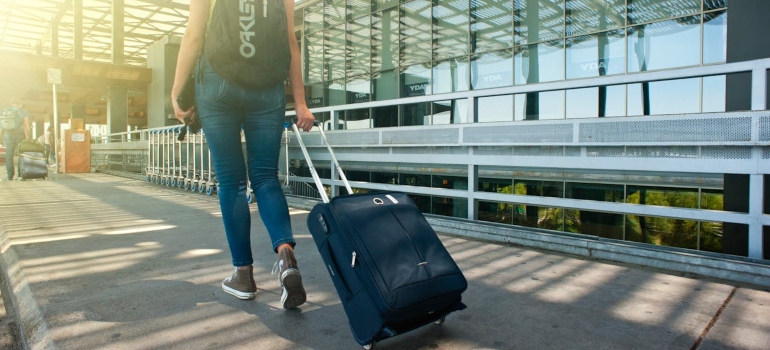Moving To Spain From US
Moving to Spain is an exciting adventure that many dream about. So why not let International Sea & Air Shipping make that dream come true?

Get a Free Moving Quote Now!
Start Your International Moving Journey





If you are on your way to become an American expat in Spain then you have landed on the right page. We are here to guide you step by step in your journey to move to Spain from the US.
Let us start by saying you have chosen a great destination for your next home! Spain is one of the most popular destinations for American expats. The emphasis on family & strong community centered lifestyle, a more relaxed way of working compared to the hustle culture, combined with much lower cost of living and stunning landscape – Spain has all the ingredients for a perfect balance of modern living and timeless charm.

Moving to Spain from the USA opens the door to exciting new experiences and opportunities. Whether you’re drawn by career prospects, education, or simply the relaxed Mediterranean lifestyle, Spain has something to offer everyone.
However, to enjoy all these you need to first cross the hurdle of documentation. A proper visa, choosing from housing options, setting up banking, securing healthcare policies – all are crucial for a successful relocation.
We offer professional guidance from International Sea & Air Shipping for your international relocation to Spain to make it seamless and worry-free. Our experienced team ensures that every detail – from packing and logistics to customs and delivery – is handled with care and efficiency.
About Spain – Bursting with Passion, Flavor, and Mediterranean Spirit
Located in the Iberian Peninsula in Europe, Spain is a perfect destination for international expats. This European country ranks, even ahead of the USA in terms of safety and a high quality of life.
Located in the Iberian Peninsula in Europe, Spain is a perfect destination for international expats. This European country ranks, even ahead of the USA in terms of safety and a high quality of life.
The country is magnificently dotted with lofty mountains to sprawling sea- beaches, quaint Mediterranean villages and a huge array of ancient, heritage sites. Naturally, Spain offers an endless list of things-to-do and experiences to savor.
Spain is an explorer’s paradise. While the countryside of the country offers ancient charms with castles, aqueducts, and many ancient ruins, the cosmopolitan areas offer all modern amenities and attractions. For instance, The Andalusian capital of Seville is renowned for soul charring musical culture. On the other hand, the Catalonian capital of Barcelona is majorly known for grand architecture and maritime industry. Madrid, the national capital, is Spain’s largest city. As the national capital this city is also a major financial hub and cultural center.
Modern Spain offers a perfect balance of cosmopolitan lifestyle with numerous facilities, good infrastructure and high quality of social service and coexists beautifully with its impressive thousand of years of history.
Visa Requirements for Moving from the USA to Spain
Securing the correct visa is necessary for a legal stay in Spain. Various visas are available, each tailored to different needs, from work to family reunification. Here are the Visa types:
- Golden Visa: For those investing in Spanish real estate or businesses, this visa grants residency quickly and is popular with property buyers. However, note that the Golden Visa has now officially been ended as of April 03, 2025. Those who are already holding this visa can continue with their residency in Spain.
- Digital Nomad Visa (DNV): This visa is particularly suitable for freelancers or professionals who are working independently for non-Spanish employers. The applicants need to show a proof of €2,762 monthly income to be eligible for this visa type.
- Student Visa: Covers both short- and long-term stays for individuals pursuing studies in Spain. This visa is generally valid till the duration of the course one has enrolled for. This visa even allows part time work of up to 30 hours per week.
- Non-Lucrative Visa: Ideal for retirees or financially independent individuals who don’t intend to work in Spain. They will need to show proof of an annual passive income of $32,000.
- Job Search Visa: Available for recent graduates, allowing up to one year for job-seeking.
- Work Visa: Requires sponsorship from a Spanish employer and provides social benefits. Applicants need to submit proof of contract, proof of all educational qualifications, clean criminal record and also proof of private health insurance.
- This Spanish visa is generally for entrepreneurs who want to open a new business in Spain. The applicants will need to submit proof of their complete business plan, and sufficient financial means. These individuals will be taxed progressively in Spain. They will also need to check with the Internal Revenue System (IRS) in the USA even after they have relocated to Spain.
- Permanent Residency: Granted after five years of continuous residence in Spain.
- Family Reunification Visa: Allows close family members to join a resident in Spain.
Choosing the correct visa is important in order to avoid legal complications. American moving to Spain may benefit from consultation services to ensure a straightforward visa application process.
Top Cities in Spain
Madrid
Madrid, Spain’s bustling capital, offers a mix of rich history, modern amenities, and a vibrant cultural scene. Expats enjoy world-class dining, museums, and dynamic neighborhoods. Planning ahead and using professional international movers ensures your relocation is smooth and stress-free.
Barcelona
Barcelona combines Mediterranean beaches, iconic architecture, and a lively urban lifestyle. Expats can enjoy the city’s art, culture, and thriving business opportunities. Hiring experienced international movers helps transport your belongings safely while navigating customs efficiently.
Valencia
Valencia is known for futuristic architecture, sandy beaches, and a relaxed Mediterranean lifestyle. Expats benefit from a lower cost of living compared to other major cities. Professional movers can simplify your relocation and ensure your possessions arrive safely.
Seville
Seville, with its historic charm and flamenco culture, offers a warm climate and vibrant lifestyle. Expats enjoy traditional festivals, beautiful architecture, and local cuisine. Using reliable international moving services ensures a hassle-free transition for your household goods.
Bilbao
Bilbao blends modern architecture with a rich cultural history, including the famous Guggenheim Museum. Expats experience a cosmopolitan lifestyle in a compact city. Hiring professional movers helps streamline your international relocation and ensures secure transport of belongings.
Malaga
Malaga, a coastal city on the Costa del Sol, offers sunny weather, beaches, and a lively cultural scene. Expats enjoy a relaxed Mediterranean lifestyle. Using professional international moving companies ensures a smooth and secure relocation.
Granada
Granada, famous for the Alhambra, provides a mix of historic charm and vibrant student life. Expats enjoy a rich cultural experience and stunning views of the Sierra Nevada mountains. Professional international movers make relocating easier and safeguard your possessions.
Housing and Accommodation
Securing housing is an important step in your relocation process, as your living situation will definitely affect your adaptation to Spanish life. Spain offers various housing options to meet diverse lifestyles, from renting in lively urban areas to purchasing a home in peaceful countryside locations.
Renting vs. Buying
Renting is usually more suitable for newcomers, offering flexibility to explore different neighborhoods. Rental contracts generally range from six months to a year, though shorter leases are sometimes available in popular tourist areas. Buying, on the other hand, is ideal for those planning to settle in Spain long-term. The purchase process involves more extensive paperwork, including legal fees and property taxes. Regional cost differences:
- Madrid: Being Spain’s capital and business hub, Madrid has higher rental costs. Renting a one-bedroom apartment in the city center typically costs around €1,200 per month, while prices in nearby suburbs are closer to €800.
- Barcelona: Known for its coastal location and cultural attractions, Barcelona has slightly lower rental prices compared to Madrid. One-bedroom apartments in central areas average around €1,000 monthly.
- Valencia: This coastal city offers excellent value for money. Renting a one-bedroom apartment in the center costs around €700, making Valencia a popular choice for those seeking affordable city living with beach access.
If you’re considering purchasing property, Madrid and Barcelona have some of the highest property prices in Spain, while cities like Seville and Zaragoza offer more budget-friendly options. Partnering with a local real estate agent familiar with expat housing will help you find a suitable home, whether renting or buying.

Banking and Taxes in Spain
Understanding banking and tax requirements will ensure smooth financial management during your stay in Spain.
- Opening a Bank Account: To open a Spanish bank account, you’ll need your passport, proof of address, and possibly a non-resident certificate if you haven’t yet obtained residency. Popular banks like BBVA and Santander offer services for expats and often have English-speaking staff.
- Tax Obligations: Spain’s tax system includes income, property, and VAT taxes. Thanks to the double taxation agreement between Spain and the USA, expats avoid paying tax on the same income in both countries, though annual tax reporting remains mandatory.
Consulting with a tax advisor can help you navigate Spain’s tax obligations and prevent any unexpected issues.
Healthcare System in Spain
Spain offers comprehensive healthcare, divided into public and private sectors, both accessible to expats.
- Public Healthcare: Funded by taxes, the public healthcare system provides a wide range of services to residents. Registration is required, and some wait times may apply, though the care quality is generally high.
- Private Healthcare: Many expats choose private healthcare for faster access to specialists and personalized services. Health insurance plans are available through providers like Sanitas and Asisa.
Work opportunities in Spain
In Spain the sectors that offer a very high demand for skilled professionals, include information technology, healthcare, engineering, education, tourism and hospitality. For lucrative work opportunities you can search online job platforms like InfoJobs, España, and also LinkedIn.
Be mindful that knowing Spanish matters for your job search in Spain. Some international companies may operate in English, but knowing the language will offer you more opportunities.
- Tourism and Hospitality: This sector offers roles in customer service, hotel management, and travel coordination.
- Education: English teaching is highly sought after, with roles available in public schools, language centers, and private institutions.
- Technology and Startups: Madrid and Barcelona have strong tech and startup scenes, with opportunities in development, marketing, and IT.

Education in Spain
Spain’s education system offers a variety of schooling options, making it adaptable for expat families with children and those pursuing higher education.
- International Schools: Popular in major cities, these schools offer curricula from the U.K., U.S., or International Baccalaureate (IB) programs, taught mainly in English.
- Private Schools: Private Spanish schools often have bilingual programs and follow the national curriculum, costing around €3,000 to €10,000 annually.
- Public Schools: Free for residents, public schools are an affordable option and are taught primarily in Spanish or regional languages, which can aid full cultural immersion.
When it comes to higher education, Spain’s universities provide high-quality, affordable education, with options in both public and private institutions.
- Public Universities: Renowned institutions like the University of Barcelona and Complutense University of Madrid offer affordable tuition (around €1,000 to €3,000 per year). While courses are often taught in Spanish, some programs in fields like business and engineering are available in English.
- Private Universities: Schools like IE University and ESADE offer a range of English-taught programs, especially popular for business and law studies. Annual tuition generally ranges from €5,000 to €20,000.
- Vocational Schools: For specialized training in fields such as hospitality and fashion, Spain’s vocational schools offer practical programs that align with job market needs.
Cost of Living in Spain
To budget for life in Spain, here’s a breakdown of typical monthly expenses:
- Housing: Expect around €1,200 for a one-bedroom apartment in Madrid, €1,000 in Barcelona, and €700 in Valencia.
- Food: Monthly grocery bills average €250 for one person. Dining out costs €10–€15 per meal at mid-range restaurants.
- Utilities: Basic utilities average €100–€150 monthly.
- Transportation: Public transportation costs €40–€50, with discounts available in large cities.
Climate in Spain
It may come as a shock that Spain is not all sunny and warm year round. Depending on the region you have chosen to live in, Spain’s climate varies a great deal. Here, we break this down for you –
If you choose the area along Costa del Sol that includes places like Málaga, Marbella, Almería etc. expect to experience more than 300 sunny days every year.
But if you have chosen places like Santander, or Bilbao, or Galicia, in Northern Spain, then prepare to encounter lots of rain, cloudy weather, and also cool temperatures year round as Northern Spain has an oceanic climate.
Places like Valencia and Alicante have comparatively mild winters, and warm summer months.
In Seville you will experience hot summer months and mild winter months.
Adapting to Life in Spain
While Spain offers a warm, welcoming atmosphere for expats, adapting to the local lifestyle and customs is key to fully embracing your new home. Here are some tips to help make your transition smoother:
- Understanding Cultural Norms: Spanish culture emphasizes family, social gatherings, and leisure, with a relaxed approach to time known as mañana culture. Punctuality is less rigid, and meals are later than in the USA, with lunch around 2 p.m. and dinner after 9 p.m. Socializing around meals is common, with gatherings often lasting hours on weekends.
- Navigating Language and Communication: While English is widely spoken in cities, learning Spanish is invaluable for daily life and building connections.
- Socializing and Making Connections: Spaniards are friendly and open, making it easy to form connections. Many cities have expat groups and social clubs, which are ideal for meeting others who understand the challenges of moving. Participating in local festivals like La Tomatina in Buñol or Las Fallas in Valencia offers a great chance to socialize and immerse yourself in Spanish culture.
- Exploring Local Traditions and Celebrations: Spain’s festivals, such as Semana Santa (Holy Week), are an integral part of its heritage, with unique traditions in each region.
- Adapting to Work-Life Balance: Spain values a balanced approach to work and leisure. Many businesses, especially in smaller towns, close from around 2 p.m. to 5 p.m. for a siesta, allowing employees time for rest or family meals. Spaniards place high value on personal time, offering a refreshing pace compared to the fast-paced work culture in the USA.

Living in Spain as an American expat
Spain is home to a large number of international expats. If you have planned to move to Spain from the US, here are a few things that you can expect as an American expat in Spain
Strong community culture: Spain has a close-knit community culture. Knowing the language may help you blend in the community faster.
Relaxed pace of life: Expect the daily life in Spain to be of much relaxed pace compared to the hustle culture in the US.
Lower cost of living: Spain has a lower cost of living compared to the US.
Weather variety: Different regions have different weather traits.
What to Know About Customs?
Understanding Spain’s customs regulations is essential for a smooth entry and to avoid unnecessary delays. Spain has specific rules for importing personal belongings, so preparing all the required documents in advance is key.
Furthermore, if you want to move your vehicle, that can also be a challenge. Luckily, whether you’re transporting a car or other large items, we offer container shipping that is a practical solution for bringing your belongings safely from the USA to Spain.

Customs Regulations for Spain
NOTE: CUSTOMS CLEARANCE FORMALITIES IN THE CANARY ISLANDS MAY VARY FROM SPAIN. WE ADVISE CUSTOMERS TO CONTACT THE DESTINATION AGENT FOR DETAILS.
Documents Required for Entry
- For Spain:
- Passport last entry stamp (original or copy legalized by Spanish Consulate at origin)
- Spanish Identification Card (D.N.I.)
- Residence Visa
- If a Residence/Work Permit is not available, you must provide an original bank guarantee. We may release the shipment with a deposit of a bank guarantee, which you must cancel within one year.
- The Certificate of Origin/Certificate of Residence Change is issued by the local city hall. It confirms the customer has resided abroad for at least 12 months (or six months in EC countries).
- Residence rental/purchase agreement (legalized) showing a minimum rent of two years
- Letter from employer stating that employee will be working in Spain
- Consular registration
- Fiscal identification number (N.I.E.)
- Non-Spanish citizens need a consular or residence resign from their origin to confirm the cancellation of their residence due to moving to Spain.
- Customs application for duty-free import
- Letter authorizing destination agent to clear shipment
- Provide a detailed inventory in Spanish, with two copies, signed and dated by the customer. Legalize it through the Spanish Consulate at the origin and include the valuation.
- You should show the contents of the cartons and confirm they haven’t been in use for over six months. List major appliances with their make, model, and serial number.
- Customers may need to provide a purchase invoice for appliances, and we should advise them to hand-carry these items.
- For the Canary Islands:
- Submit your original passport with the last entry stamp by the police or a notarized photocopy.
- Certificate of Domicile obtained from the local Town Hall (original)
- N.I.E. Number – identification number (original), could take two to three weeks to obtain
- Flight tickets on entry (original)
- Inventory (original) in Spanish with a valuation signed by the customer
- Rental Contract or Escritura-Title Deed to property (original)
- Application of Residence
- All islands may vary in required documentation
- Spanish Customs will assess import duties and taxes on shipments that do not have proper documents. Spanish Customs will determine values for these duties and taxes, leading to delays and extra charges for the shipments.
- If you don’t start the clearance procedure due to missing documents, Spanish Customs may auction the shipment after one month.
Customs Regulations
SHIPMENT MUST NOT MOVE UNTIL ALL DOCUMENTS ARE IN ORDER AND CUSTOMER IS IN SPAIN
- Used household goods may be duty-free if:
- You need to prove ownership of the item for a minimum of six months (or three months in EC countries) before coming to Spain.
- Will remain in customer’s possession for a minimum of one year.
- The contents correspond to customer’s status
- You can import used household goods no later than 12 months after you obtain a Residence/Work Permit in Spain.
- The shipment should arrive within three months of the customer’s arrival. If it arrives later, a special permit is required, leading to additional charges and delays.
Prohibited Items
- Weapons and ammunition (need special permit from the Spanish Police, obtained by the owner from “Direccion General de la Guardia Civil”)
- A complete description such as model, caliber, serial number, etc. are required
- Spanish Police will retain it until final permission is granted
- Drugs
- Pornographic material
- Cleaning fluids
- Paints
Dutiable/Restricted Items
- New items (less than six months old)
- Tobacco products
- Foodstuff, antiques, art objects and ammunition require special permits
- Liquor
Motor Vehicle Regulations
- You can duty-free import for a limited time (six months). Import duties and taxes will become payable when applying for a permanent permit.
- Customer must have resided outside Spain for at least twelve months (six months for EC countries)
- The customer must have the vehicle in use for a minimum of six months.
- Prohibitions apply to modifications that alter the original design.
- You can obtain a temporary permit at Customs, which is valid for six months.
- Customer must obtain Spanish Vehicle Registration within this time
- Documents required:
- Purchase Invoice or Certificate of Ownership
- Registration or Title
- Circulation Permit
- Tax Receipt
- Liability Insurance (Valid and running)
- License plates from country of origin
- Identification Card (“Documento Nacional de Identidad”)
- Passport or Residence Card
- Title issued under the owner’s name
- Valid Insurance
All documents must be original copies
Pets and Animals Regulations
- Dogs, cats, birds, etc. allowed with Health and Vaccination Certificate (CONSULARIZED at origin) from veterinarian
NOTE – Customs regulations are subject to change at any time. The proceeding information is a brief summary of customs regulations applicable to household goods shipments to this destination and is being provided for general guidance to assist our Agents and customers. Since such regulations are subject to change without notice, International Sea & Air Shipping cannot be held liable for any costs, damage, delays, or other detrimental events resulting from non-compliance. Always double check with your local embassy or consulate.

Preparing for Your Move from USA to Spain: Key Considerations
Moving to Spain requires early planning to ensure a stress-free transition. Start organizing your move well in advance, allowing ample time to take care of everything from packing to securing a visa and finalizing travel plans. Here’s a step-by-step guide to keep you on track:
- 6–8 Months Before Move: Begin by exploring Spanish cities and identifying the best place to settle based on your lifestyle. Madrid offers an urban atmosphere with a strong business sector, while Barcelona combines city living with a coastal vibe. Valencia and Malaga are more relaxed and affordable, ideal for families or retirees. During this period, research visa options, as processing can take several months.
- 3–5 Months Before Move: Start the application for your visa and gather important customs documentation. At this stage, contact an international household moving company to begin organizing the packing and shipment of your belongings. Consider using packing services for overseas shipping to ensure items are securely prepared for the long journey. Companies like International Sea & Air Shipping offer specialized services for household items, vehicles, and pets, making the logistics manageable.
- 1–2 Months Before Move: Finalize all logistics for your travel and housing in Spain. Confirm accommodations, transportation arrangements for pets, and essential documents for customs and residency. If you’re importing a vehicle, ensure you have the necessary paperwork, as vehicle importation in Spain requires additional documentation.
Sticking to a clear timeline will reduce last-minute stress and help you avoid common mistakes when moving to Spain. Partnering with an experienced overseas moving company will ensure the safe and timely delivery of your belongings.

International Sea & Air Shipping Services for Your Move to Spain
When moving valuable or delicate items, such as artwork or fine art, professional fine art shipping services ensure specialized handling for safe international transit international piano movers can also manage prized instruments, while our team carefully handles pets and other high-value belongings. Working with experienced international movers helps navigate customs requirements and guarantees your possessions arrive securely.
Moving from the USA to Spain is an exciting opportunity, but it requires detailed planning — from customs clearance to housing arrangements. With International Sea & Air Shipping, you can simplify every step of your move. Our professional moving services provide reliable support, making your relocation to Spain smoother, safer, and stress-free. Contact us today to start your international move with confidence.
FAQ’s
What type of visa do I need to move from the USA to Spain?
The visa you need depends on your reason for moving. Options include a work visa, student visa, and non-lucrative visa for retirees. Consulting with an immigration expert can help determine the best choice.
Are there restrictions on what I can bring into Spain through customs?
Yes, Spain restricts items like illegal drugs, hazardous chemicals, and certain electronics. Be sure to review customs regulations and consider consulting a moving company to ensure compliance.
Can expats access Spain’s healthcare system?
Yes, expats residing in Spain can use public healthcare, though many choose private insurance for quicker access to specialists. Public healthcare is high-quality and accessible once you register.
Is learning Spanish necessary for daily life in Spain?
While many people in cities speak English, learning basic Spanish helps with daily tasks and building connections. Simple phrases go a long way in making interactions easier and more enjoyable.
What’s the best way to adjust to Spain’s work-life balance?
Spain values a balanced approach with a slower pace, often with a mid-day siesta in smaller towns. Embrace this change, as it allows for more family time and relaxation, which is key to adapting to Spanish culture.
